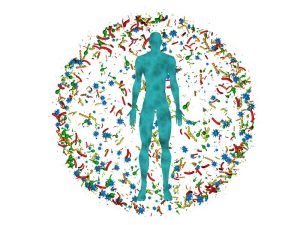Microbes are everywhere! They exist in us, on us and around us at all times in complex microscopic ecosystems called microbiomes. Microbiomes are a collection of bacteria, viruses, archaea and fungi that naturally live in community on and within larger living creatures as well as within a variety of terrestrial, marine and aquatic environments.
 Your body is made up of as many microbes as human cells. Each portion of your body—the gut, skin, nasal and oral cavities—have unique microbiomes, which were established within the first year of life. Most of the microbes in your body are symbiotic—you and the microbe both benefit from the relationship. While some microbes have the potential to be pathogenic, in a healthy body, symbiotic and potentially pathogenic microbes exist in a balance that keeps your body functioning.
Your body is made up of as many microbes as human cells. Each portion of your body—the gut, skin, nasal and oral cavities—have unique microbiomes, which were established within the first year of life. Most of the microbes in your body are symbiotic—you and the microbe both benefit from the relationship. While some microbes have the potential to be pathogenic, in a healthy body, symbiotic and potentially pathogenic microbes exist in a balance that keeps your body functioning.
How do microbiomes affect health and disease?
Commensal microbes, the microbes that live in your body, act as a first line of defense against external pathogens. These microbes actually produce their own antimicrobials to fight off competing microorganisms. The intestinal microbiome plays a crucial role in digestion and immunity. Your gut bacteria help break down food into nutrients and synthesize essential vitamins humans can not produce. Microbial imbalance, called dysbiosis, can result in the rise of opportunistic pathogens, gut barrier dysfunction, intestinal mucous degradation and chronic inflammation.
Microbiome and Health Graduate Certificate
Microbiomes are key components in health homeostasis, disease progression and disease treatment. The University of Florida Department of Microbiology and Cell Science offers a Microbiome and Health Graduate Certificate where you will acquire skills in understanding probiotics, antimicrobial resistance and virology through a comprehensive study of the human gut microbiome, a focus on emerging pathogens, an exploration of the virome and more.
The Microbiome
The Microbiome course intends to teach students the modern tools available to analyze the microbiome and its role in a given environment. Students will learn the molecular tools used in microbiome analysis including 16S rRNA sequencing, whole genome sequencing, epigenomics, transcriptomics, small RNA analysis, proteomics and metabolomics.
Probiotics
The Probiotics course will provide a conceptual background in microbiology and immunology for the use of microorganisms for the prevention or treatment of animal and human diseases. After successful completion of this course, students will be able to compare and contrast the mechanisms used by probiotic microorganisms to modulate the host immune responses in the animal and in the human host and discuss current research efforts and proposed applications of probiotics for animal and human health.
Antimicrobial Resistance
The overuse of antimicrobial agents has led to a vast spread of antimicrobial resistance among bacteria, viruses, parasites and fungi. While we are currently witnessing a constant increase in antimicrobial resistance, the development of novel treatments has almost completely ceased. This course will provide an extensive background on antimicrobial resistance, treatments, and respective mechanisms. Upon completion of this course, students will be able to identify major classes of antibiotics and their mechanisms of action. identify means of detecting antibiotic resistance, and describe therapeutic approaches to fight antibiotic resistance.
Virology
The Virology course is designed to introduce you to the field of virology, teach you the components of viruses, their replication schemes and how the various types of viruses infect and replicate in host cells. At the end of the course we will use this foundational knowledge to understand methods used to prevent viral infection and spread.
 5
5
